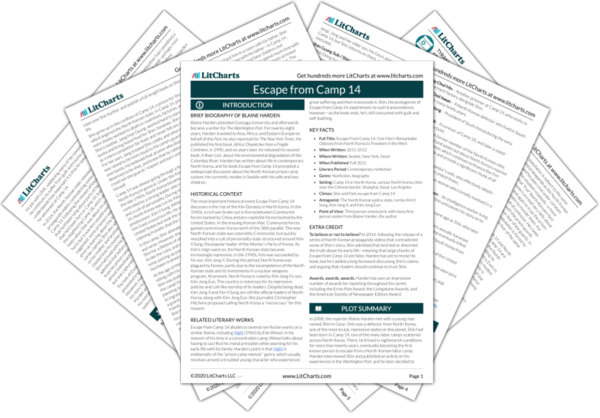Summary
Analysis
Shin runs away from Camp 14 and reaches a farmer’s shed. Inside, he finds corn, a military uniform, and a coat. Shin uses the uniform to disguise himself as “just another … ill-nourished North Korean” veteran. He follows a road toward a village, where he finds that news of his escape hasn’t broken yet. By late evening, he’s walked about six miles and entered Bukchang, a mining town. He spends his first night outside the camp sleeping in a pigpen.
By a remarkable coincidence, Shin was able to find food and warm clothing within a couple hours of escaping from the prison camp—had he not, he might have died in the cold before he ever got far from the fence. Some people have questioned this coincidence, accusing Shin of lying about his past once again.
Themes
The next morning, Shin wakes up early and begins to explore the town. He’s amazed to see North Koreans going about their business without any guards. Compared with Camp 14, life in North Korea seems joyful, colorful, and even luxurious. Shin begins to feel “wonderfully free.” He breaks into a house and eats three bowls of rice there. Then, he takes the rest of the rice and keeps walking. He sells the rice to a market woman—his first experience with money—and then uses the cash to buy some cookies and crackers. Next, Shin encounters a group of unemployed workers in search of a job. Saying he is from the Bukchang area, he joins the workers, reasoning that he’ll have more luck as part of a group.
Life in North Korea is (probably) rarely colorful or luxurious—but from Shin’s perspective, it was paradise. For the first time in his life, Shin could walk where he wanted, eat as much food as he needed, and even buy and sell things to other people. Ironically, the brutality and violence of Shin’s early life in the camp prepared him for his eventual escape: almost anyone else would give up in despair after escaping, but Shin, who’d grown up in utter despair, found the strength to keep going.
Themes
In North Korea, Harden writes, people can often walk directly into China or South Korea, provided that they bribe the soldiers (many of whom live primarily off of bribes). In 2012 alone, about 24,000 people defected to South Korea, and there’s an enormous North Korean black market for leaving the country. There are even businessmen in Seoul who broker escapes from North Korea, complete with a forged passport and a plane ticket to Seoul. While many people who try to sneak over the border are executed, soldiers often have a stronger incentive to accept bribes.
Shin’s goal was to sneak over the Chinese border and, eventually, make his way into South Korea. As the passage suggests, doing so wasn’t as difficult as the North Korean government claimed: there was a huge black market of bribes and forged passports, which the Kim dynasty was too disorganized to do anything about.
Themes
Shin begins to associate with other homeless workers, modeling his behavior off of theirs. Traders show him places where he can sleep without attracting attention, and Shin makes a point of sharing any food he steals with the other workers, so that he can learn about how to get out of North Korea.
Shin was clever about cooperating with fellow wanderers: he shared some of his food with other people, effectively “buying” the information he needed about getting into China.
Themes
Get the entire Escape from Camp 14 LitChart as a printable PDF.













